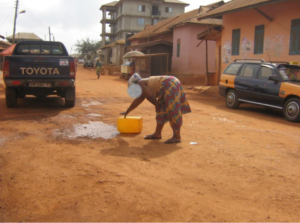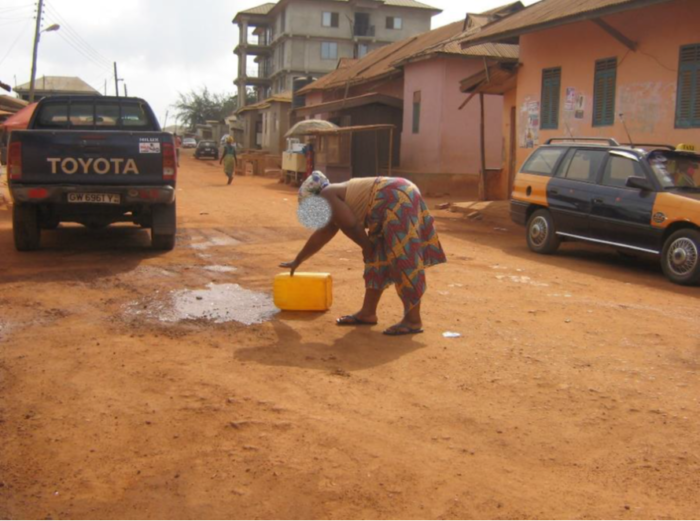The perimenopause: a hidden WASH issue
Amita Bhakta, Brian Reed, Harold Esseku, Yvonne Esseku, and Julie Fisher
This paper is based on the doctoral research of the first author. This blog originally appeared on the IWA Publishing website and can be viewed here.

Discussions around the inclusion of women in water, sanitation and hygiene provision are long standing, but some issues for an increasing number of women “ of a certain age” – remain ‘hidden’. Our new paper in the Journal of Water, Sanitation and Hygiene for Development, The hidden WASH needs of perimenopausal women, reveals the experiences of women in Ghana who are at the time when their periods will permanently stop, at the menopause, taking a journey through a stage called the perimenopause.
The women we met through this research revealed that their water, sanitation and hygiene (WASH) needs during the perimenopause had not been given attention before. However, if we engaged with them appropriately, then they would share them. We talked to them on their own, enabled them to meet and discuss these issues with other women and draw a map of their community, or gave them a camera to take photographs of their needs. Getting women to speak the unspoken required a lot of creativity to put them at the centre of the process from beginning to end. It all began at a library computer with a search for literature on the topic of WASH for women aged in their 40s and 50s. They experience symptoms ranging from heavy menstrual periods to hot flushes and night sweats. The databases were simply not giving us any clues on the topic, no literature was found. What were they doing to manage these symptoms behind the closed toilet and bathroom doors? It was all very… hidden. The only way forward to unveil this ‘hidden’ knowledge was to go to the best source: the perimenopausal women themselves. Talking to women in the UK, where the lead researcher was based, was a good place to start. Having full access to water meant that it was clear to see and understand the additional and specific WASH needs during the perimenopause. These gave us a direction of topics to explore with perimenopausal women in a low or middle-income country- in this case, Ghana.
On landing in Ghana in the hottest and driest season of the year, meeting the research team and chatting to perimenopausal women in their homes in Kumasi and Accra over a period of six weeks, a more detailed picture of this hidden phenomenon where WASH services were lacking began to emerge. Intense sweating and large, uncontrollable flows of menstrual blood were bringing women out of their beds in the dead of night to bathe outside – at very odd hours. Frequently changing clothes stained by blood, sweat, and urine for women with incontinence piled the laundry high. But… bathing? Laundry? Gender and social science professionals working in the WASH sector never even mention these issues, let alone address them! Which probably explained why the women we met told us in interviews, maps and through their photographs that they struggled to bathe and wash their clothes – the facilities were not designed to make these activities easier for women ‘of a certain age’. This is besides the joint pain that comes with getting older. Despite being so important in perimenopausal women’s daily routines, the engineers who constructed them had no idea about these issues and could not build them with these aspects in mind.
It is not just about water supply. Not having any covered drainage connected to washing facilities added the worry of this rather messy, ‘bloody’ secret of heavy menstrual periods for middle-aged women. The secret quite literally comes out into the open street in the form of blood-stained wastewater. Which brings us onto another point: menstrual hygiene matters for women during the perimenopause to manage menstruation as much as it does for adolescent girls. Reaching this lifestage adds the additional worry of leaking large volumes of menstrual blood, often when it is least expected.
So, as well as learning about these experiences, what can be done about them? Whilst we’re understanding these insights for the first time, the WASH sector does not need to reinvent the wheel; instead, it needs to begin to apply existing solutions, suggested by WASH experts in Ghana who read the stories from the women themselves, to address perimenopausal women’s needs. It not difficult to take action to address these hidden issues, by building better user-friendly, gender-sensitive bathing, laundry and toilet infrastructure, ensuring regular access to water supply near to home and widening access to high-absorbency sanitary products. More widely, it’s our responsibility as a sector to make more effort to consider “hidden” topics. This research is breaking the silence on the perimenopause, helping understand perimenopausal women’s WASH needs, engaging in training on how to meet these needs, and implement the solutions required. What other issues are hidden because we are not listening?
This blog was written by Amita Bhakta and Brian Reed. The original paper was written by Amita Bhakta, Harold Esseku, Yvonne Esseku, Julie Fisher and Brian Reed.
